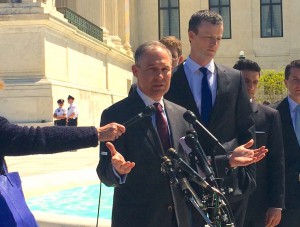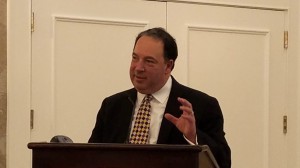
EPA Administrator Scott Pruitt reopened the review of tougher CAFE standards going into effect for 2025.
Automakers want federal regulators to revise fuel efficiency mandates because meeting the standard for 2025 of 54.5 mpg would be cost prohibitive and, perhaps more importantly, U.S. consumers do not care about the mandate anyway, according to two trade association groups representing automakers.
The revelation, which comes two months after automakers said they were onboard with the tougher rules, was unveiled in testimony submitted in advance of meetings being held by the Environmental Protection Agency and the National Highway Traffic Safety Administration about the topic.
The Alliance of Automobile Manufacturers, which represents General Motors, Toyota, Volkswagen and other companies, also points out that EPA understated the costs of technologies needed to meet the 2025 requirements.
However, Global Automakers, a group representing Honda, Hyundai and others, point to changing consumer preferences to bigger vehicles as a problem not accounted for in the standards.
(Automakers do about face on CAFE standards. For the story, Click Here.)
“There is, simply put, a misalignment between the increasing stringency of the standards and the decreasing consumer demand for fuel efficiency,” the group said in comments filed Thursday with the EPA.

AAM President Mitch Bainwol said that recent polling shows consumers believe automakers should have to meet tougher emissions and fuel efficiency standards.
The two advocacy groups don’t actually for a reduction in the standards, which perhaps allows them to maintain that they are sticking to earlier assertions that they are in favor of the tougher mandate, which back then was a reversal of their long-held position that the CAFE rule for 2025 was too tough to reach.
Mitch Bainwol, AAM president, told a crowd at the annual Center for Automotive Research Management Briefing Seminars in Traverse City, Michigan, in August that consumers want tougher regulations when it comes to fuel economy and their voices should be heard.
“There is a profound consensus perspective on fuel economy and greenhouse gases,” he said. “The only issue is the degree of the slope.”
(Click Here for details about what advocates for CAFE standards are saying.)
He said this because AAM polled consumers and that found almost two thirds agreed the government should increase the standards. That support was spread pretty evenly between the two political parties: 69% of Democratic respondents and 63% of Republicans said standard should be tougher.
As a result, he suggested a new deal requires some compromise on how much automakers should improve fuel efficiency over time, which likely explains the “revise” and not “reduce” language in the group’s submitted testimony.
The Obama administration finalized rules in 2012 to double the fleetwide average fuel economy to 54.5 miles per gallon by 2025, but the EPA revised it to 51.4 mpg due to the rising number of trucks being purchased by consumers as gas prices fell.
The EPA said that would result in a real world average of 36 mpg by 2025, because of credits automakers receive and differences in test procedures versus real-world driving. Automakers earn credits by producing cars and trucks that exceed the requirements in a given year – and can then apply credits to deficits in future years.
(To see more about attorneys general suing Trump administration over CAFE, Click Here.)
The testimony is being collected as part of the EPA’s ongoing review process of the mandates it reopened earlier this year. The State of California, which is currently allowed to set its own standards, said it has no intention of moving off the rules established by the Obama administration.
